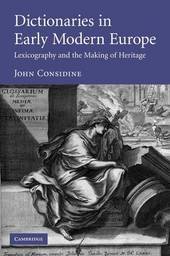
|
Dictionaries in Early Modern Europe: Lexicography and the Making of Heritage
Paperback / softback
Main Details
| Title |
Dictionaries in Early Modern Europe: Lexicography and the Making of Heritage
|
| Authors and Contributors |
By (author) John Considine
|
| Physical Properties |
| Format:Paperback / softback | | Pages:408 | | Dimensions(mm): Height 229,Width 152 |
|
| Category/Genre | Literature - history and criticism
History of specific subjects |
|---|
| ISBN/Barcode |
9780521178457
|
| Classifications | Dewey:413.028 |
|---|
| Audience | | Professional & Vocational | |
|---|
| Illustrations |
Worked examples or Exercises
|
|
Publishing Details |
| Publisher |
Cambridge University Press
|
| Imprint |
Cambridge University Press
|
| Publication Date |
3 March 2011 |
| Publication Country |
United Kingdom
|
Description
Dictionaries tell stories of many kinds. The history of dictionaries, of how they were produced, published and used, has much to tell us about the language and the culture of the past. This monumental work of scholarship draws on published and archival material to survey a wide range of dictionaries of western European languages (including English, German, Latin and Greek) published between the early-sixteenth and mid-seventeenth centuries. John Considine establishes a powerful model for the social and intellectual history of lexicography by examining dictionaries both as imaginative texts and as scholarly instruments. He tells the stories of national and individual heritage and identity that were created through the making of dictionaries in the early modern period. Far from dry, factual collections of words, dictionaries are creative works, shaping as well as recording early modern culture and intellectual history.
ReviewsReview of the hardback: 'All in all, Dictionaries in Early Modern Europe is an exceptionally erudite, thorough and trustworthy book, written by a learned scholar, indisputably of great value and use for philologists, book historians and historical bibliographers.' Lexikos Review of the hardback: 'John Considine's book is admirably erudite and informative.' Giulio Lepschy, University College London
|